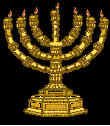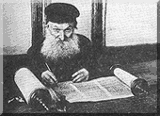 Since
1865 Chaim Berlin was a Moscow rabbi.
Since
1865 Chaim Berlin was a Moscow rabbi. Rabbi Chaim Berlin
Rabbi Chaim Berlin was born in Volozhin in 1832.
He was a son of famous Volozhin rosh-Yeshiva (1854-92) Naftali Tsvi Ieguda Berlin (known as Natsiv).
His father gave Chaim a rabbinic education.
 Since
1865 Chaim Berlin was a Moscow rabbi.
Since
1865 Chaim Berlin was a Moscow rabbi.
After this, since 1889 he lived in Volozhin, and worked as the head of rabbinic court, since 1892 till 1897 he was rabbi in Kobrin, since 1897 - in Elizavetgrad (today, Kirovograd).
In 1906 he left Russia Empire. He went to Jerusalem. In 1909 he was elected a chief rabbi of Askenasi community of Jerusalem.
Rabbi Chaim Berlin died in 1912, in Jerusalem.
Rabbi Naphtali Zebi Judah Berlin
 The
Yeshiva of Volozhin was started in 1803 and become the most important
Russian Yeshiva. Its founder and president, Hayim of Volozhin, was an
opponent of Pilpul,
like his teacher, Elijah
Vilna.
The
Yeshiva of Volozhin was started in 1803 and become the most important
Russian Yeshiva. Its founder and president, Hayim of Volozhin, was an
opponent of Pilpul,
like his teacher, Elijah
Vilna.
The number of pupils was small at first, but speedily increased, although only those who had recieved a thorough previous education were admitted. After the death of Haym of Volozhin (1821), his son, Rabbi Isaac of Volozhin, directed the institution in 1824.
The Yeshiva, which now had more than 200 pupils, was closed by order of the goverment. In spite of this, it actually continued to maintain its existence up to the time when it was again officially sanctioned in 1843.
When Isaac of Volozhin died, he was succeeded by his son-in-law Rabbi Naphtali Zebi Judah Berlin; after 1854 the latter and Joseph Baer Soloweichik were jointly in charge of the Yeshiva.
Berlin was adherent of Elijah Vilna`s method of teaching, while Soloweichik favored a Pilpulistic method. As a result of this a dispute arose; after it had been settled, Berlin retained the sole direction.
In 1858 the Yeshiva was again closed by the goverment, but thanks to the
energies of Berlin, it was further developed in
spite of this, and numbered about 400 students.
After a second legalization and another closing, its re-opening was violently opposed by the Maskilim (Haskalah supporters); it was accomplished only under the condition that certain secular studies also should be taught there (1891).
These conditions were not carried out, and this led to the final official closing (1892). A
fter this it still continued to exist, despite the lack of official sanction, until the first World War, under the direction of Rabbi Raphael Shapiro, the son-in-law of Berlin.
During the Yeshiva hundred years of existence its influence on the cultural life of Russian Jewry was unusually strong.
Many of the important rabbis of Russia, Poland and other countries as well as many Hebrew authors, were students there.
Source: Universal
Jewish Encyclopedia inc., New-York, 1946, Vol.10.